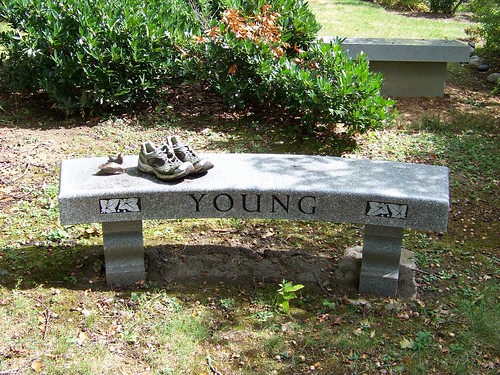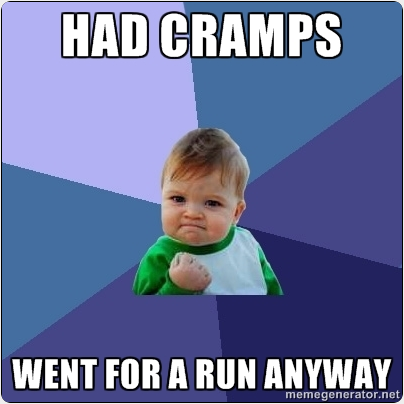Many people (including Ken and my mom) sent me the article that appeared in the Wall Street Journal this week entitled, “One Running Shoe in the Grave: New Studies on Older Endurance Athletes Suggest the Fittest Reap Few Health Benefits.” Maybe everyone thinks I’m going to drop dead running. I doubt it. And if I do, I won’t be running in a cemetery.
This is an actual grave in Cleveland where someone left running
shoes as an offering. It is thought that “Young” was a runner.
If you didn’t read this controversial article, it is interesting food for thought. But let’s just say, for every action, there has to be an opposite reaction. Like how coffee kills you but it also makes you grow hair on your chest and keeps dementia away. Or, eggs are evil and will clog your arteries – oh, wait never mind, there are actually some decent health benefits. Basically what I have decided is that you can make a case for any way that you live your life. You just have to find that one study that supports it.
If you read my blog, you know that I not only do I think running is amazing for you spiritually, mentally and physically (maybe not financially), but I also think it’s a wonderful antidote to growing older (read my post about aging and running HERE). My philosophy has always been that despite any nagging injuries, the risk of falling down on the trail or the very slight chance you will die during a marathon (a one in 100,000 risk), running is a gift and is far, far better than hanging out on the couch eating Doritos and Twinkies (oops, too soon?) and drinking Coors Light.
That said, here’s what this article contends (in a nutshell – go read it for details):
- For older athletes (I’m not sure what “older” means), running can hurt your heart to the point that the benefits of running are erased
- Running too fast and too far could make you die quicker
- Running 25+ miles per week gives you no benefit in regards to lengthening your life
- Running in excess of 8 mph (7:30 minute/mile pace)gives you no benefit in regards to lengthening your life
- Most cardiologists agree that “endurance athletics significantly increases the risk of atrial fibrillation, an arrhythmia that is estimated to be the cause of one third of all strokes. ‘Chronic extreme exercise appears to cause excessive 'wear-and-tear' on the heart’."
Hmmm…
My first thought is that I’m okay because I can’t run 7:30 minute miles.
In all seriousness, I don’t care what this study says. It won’t change that I like to run far and sometimes for hours at a time. It won’t change that I want to get faster or run into my old age. What the study does not account for is that I don’t only run for health benefits. In fact, if there was absolutely no real health benefit to running, but it still made me feel on top the world, I would still do it.
I would bet all the Power Ball winnings that I didn’t win that few runners will let a study like this really change what they do. I think this because like anything in life, you take a risk. You find what you love to do be it jumping out airplanes, knitting blankets for babies or photographing elephants in Africa and you accept that you take chances (Yes, you could stab yourself in the eye with a knitting needle). How are we supposed to live and love life if we let ourselves be so consumed by every little thing that could happen to us? I can’t and won’t exist that way.
I do, however, think it’s important to be responsible. Train with a heart rate monitor to be sure your heart rate is where it should be for certain types of runs. Get regular physicals. Eat and rest well. Don’t beat up your body – give it TLC in the form of decent recovery, cross training and bodywork like massage and chiropractic. Listen to your body and be in touch with the messages it is trying to give you. And, if you have a heart condition, for God’s sake pay attention and talk to your doctor.
Do you think an article like this will make you think twice about how you run in terms of miles per week and/or speed?
Do you think that running is inherently risky? Do the benefits outweigh the potential hazards?
SUAR










































 In fact, today I even bought chocolate stuffed advent calendars for my kids. It is the only time of the year they get to have a side of candy with their breakfasts. I am hoping that when they are older and in therapy about what a miserable parent I was they remember how I let them have chocolate in the morning from December 1st to December 24th. POTY (Parent of the Year).
In fact, today I even bought chocolate stuffed advent calendars for my kids. It is the only time of the year they get to have a side of candy with their breakfasts. I am hoping that when they are older and in therapy about what a miserable parent I was they remember how I let them have chocolate in the morning from December 1st to December 24th. POTY (Parent of the Year).




